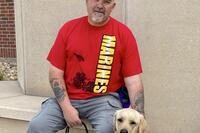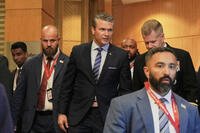The remains of a Special Forces veteran killed in Ukraine this spring appear to be finally headed back to the U.S., according to his family.
Nick Maimer, 45, a retired staff sergeant, was killed in the eastern city of Bakhmut in mid-May when the building he was in collapsed after an artillery strike. His death was broadcast around the world by Russian mercenary Yevgeny Prigozhin in a morbid propaganda video; a month later, Prigozhin would lead a failed rebellion against Moscow with his private military company, the Wagner Group.
Amid the chaos enveloping Russia, Maimer's family and friends were subjected to an arduous, months-long effort to reclaim his remains, a process that nearly 20 families of U.S. veterans have or will have taken during the war in Ukraine so far.
Read Next: Army's New Enlisted Leader: The Bet a Green Beret Can Lead the Rank and File
"We've just kind of been in limbo," Amanda Weishaar, Maimer's sister, told Military.com in a phone interview Friday. "Waiting and not knowing -- it's prolonged the grieving process quite a bit."
She said that the transfer process was riddled with unknowns for her family.
Over the last three months, Weishaar recalled thinking "maybe it's going to happen this date, but then another month goes by and it still hasn't happened as far as when his body's going to be cremated, or where it's going to be cremated, or where it's going to be flown and who's involved in making that happen, and what the cost is going to be and if that cost is going to be covered."
Maimer's return to the U.S. was perilous and uncertain from the beginning. It was clear from Prigozhin's video that his body was in Wagner's hands. Complicating things further, Ukraine views the pro-Russian mercenaries as terrorists, and the U.S. recently referred to them as a "proxy force" for the Kremlin. Any exchange was going to be filled with tension.
Retired Army Lt. Col. Perry Blackburn, the founder of a nonprofit organization that Maimer volunteered with in Ukraine, told Military.com in May that he had attempted to reach Prigozhin to organize a transfer.
While it is unclear how and where the transfer occurred, Blackburn said that the Ukrainians were "pivotal" in its success. Friends of Maimer lauded Blackburn's efforts in helping them navigate the transfer process. By the end of the month, Maimer's body was in Ukrainian hands en route to Kyiv.
Karl Watts, who met Maimer through the Big Brothers Big Sisters program and knew him well over the last three decades, told Military.com that the initial news of his journey to Kyiv was elating.
"We didn't expect to recover his body for months because it was an active conflict area," Watts said. "Just the fact that they were able to recover his body so quickly was a huge relief."
That initial relief was short-lived. Uncertainty about when Maimer's remains would arrive back to the U.S. welled within his circle of friends and family as the process ground along slowly. Several Ukrainian and U.S. entities connected with Maimer's loved ones, according to Watts, who liaised with them amid a "whirlwind of chatter."
"Things moved a lot slower than expected," he said, adding that both Ukrainian and U.S. agencies like the Ukrainian military, State Department and FBI aided the effort.
"I was pleased that the State Department was quite involved in everything from beginning to end," Watts said. "I think they did the best they could in this situation trying to help coordinate the things, but there was no overriding agency or organization in it.
"No one had ultimate authority or [could] say, 'This is what's gonna happen, and this how it's gonna go,'" he said.
For its part, the State Department told Military.com on Friday that "the U.S. government takes its role in such a situation very seriously." It would not confirm that Maimer's remains are en route to the U.S. or detail its involvement in the process.
A particularly frustrating procedure involved getting DNA confirmation that the remains were indeed Maimer's. Watts said that samples from Maimer's parents had to be sent to a lab in Ukraine for analysis.
It would be another month before Maimer's circle received a positive DNA test. In the interim, friends and family had gone on to memorialize him with pictures and memories, Watts said. In June, Weishaar established a GoFundMe page with a $10,000 goal for Maimer's memorial, with any leftover proceeds going to veterans charities.
"I think it's important to honor veterans specifically with that," she said. "It's just important to offer that support in any way that we can, because it doesn't always seem like the government takes care of their own as they should."
Weishaar said she recalled four or five times when her family would get an update -- raising their hopes for his return -- only to have it postponed. Because of the delays, some of Maimer's loved ones remain uncertain about the latest news of his return.
Weishaar expressed frustration toward the presidential administration.
"President Biden is very vocal about his support for the war, but has shown zero support for Nick," Weishaar said.
In July, the Ukrainian Ministry of Defence posted a video tribute to Maimer. In it, he said of Russia's invasion: "In recent history, it's one of the most clear-cut injustices, and I knew I would be able to help the Ukrainians."
Maimer was cremated in Kyiv early this week. Watts said he learned Friday from a Ukrainian funeral home he had been working with that Maimer's remains would start their route home from Warsaw, Poland.
"We should have him back in the States within the next week or two," Watts said. From there, he and family will drive to Salt Lake City, Utah, where Maimer is expected to arrive.
Watts said he expects a funeral service in September or early October.
Despite the uncertainty he felt over the last few months, Watts feels thankful to the State Department, Ukrainian military, the funeral home, Blackburn and others.
For some in Maimer's circle, the last three months -- and the frustrations associated with them -- have made it difficult to grieve.
"Nick was one of the most selfless people I've ever met," Weishaar said. "He would give his shirt off his back in an icestorm to make sure someone else was comfortable and cared for. It's disgraceful that his own government wouldn't care for him in that way."
-- Drew F. Lawrence can be reached at drew.lawrence@military.com. Follow him on Twitter @df_lawrence.
Related: 'That Was Nick': Special Forces Vet Killed in Ukraine Remembered as Big-Hearted Protector














